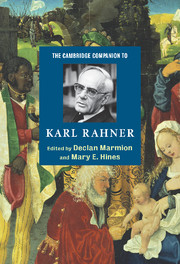Book contents
- Frontmatter
- Introduction
- Part I Spiritual, Philosophical, and Theological Roots
- Part II Theological Investigations
- 4 Method in theology
- 5 Revelation and faith
- 6 Trinity
- 7 Christology
- 8 Ecclesiology and ecumenism
- 9 Ministry and worship
- 10 Ethics
- 11 Eschatology
- Part III Conversations Ongoing
- Part IV Retrospect and Prospect
- Appendix
- Index
11 - Eschatology
from Part II - Theological Investigations
Published online by Cambridge University Press: 28 May 2006
- Frontmatter
- Introduction
- Part I Spiritual, Philosophical, and Theological Roots
- Part II Theological Investigations
- 4 Method in theology
- 5 Revelation and faith
- 6 Trinity
- 7 Christology
- 8 Ecclesiology and ecumenism
- 9 Ministry and worship
- 10 Ethics
- 11 Eschatology
- Part III Conversations Ongoing
- Part IV Retrospect and Prospect
- Appendix
- Index
Summary
Eschatology, or the doctrine of the Last Things, has had a chequered history in Christian theology. Rooted in the belief concerning Christ's return (parousia) in glory to judge the living and the dead and his eternal kingdom and in the expectation of the universal resurrection, the Christian teaching on life everlasting occupied the central position in the theology of the early Church. Theologians of both East and West kept in the forefront of Christian consciousness the New Testament conviction about the final consummation of human history through Christ in God's reign (see 1 Corinthians 15:28). Such is the case with, for instance, Irenaeus (c. 130- c. 200) with his concept of recapitulation (anakephalaiosis), Origen (c. 185- c. 254) with that of universal restoration (apocatastasis), and Augustine (354-430) with that of the City of God (civitas Dei). Furthermore, during the first few centuries of the Christian era, this eschatological consciousness was also heightened by millenarianist groups such as the Gnostics and the Montanists.
Except for brief outbursts of millenarian enthusiasm with Joachim of Fiore (c. 1135–1202), and, much later, with the Anabaptists and the Bohemian and the Moravian Brethren during the Reformation, the Church’s official consciousness of Christ’s glorious return and one-thousand-year rule was gradually eclipsed, and with it the collective eschatology that discusses the meaning and destiny of human history. In late scholasticism, and subsequently in neo-scholastic manualist theology, the main focus was the post-mortem fate of the individual.
- Type
- Chapter
- Information
- The Cambridge Companion to Karl Rahner , pp. 174 - 192Publisher: Cambridge University PressPrint publication year: 2005

